
Patsy Cline was an American singer. She is considered one of the most influential vocalists of the 20th century and was one of the first country music artists to cross over into pop music. Cline had several major hits during her eight-year recording career, including two number-one hits on the Billboard Hot Country and Western Sides chart.
"Wheel of Fortune" is a popular song written by Bennie Benjamin and George David Weiss and published in 1951. It is best remembered in the 1952 hit version by Kay Starr.
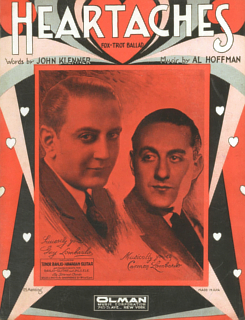
"Heartaches" is a song written by composer Al Hoffman and singer John Klenner and originally published in 1931. A fast-tempo instrumental version of the song by Ted Weems and his Orchestra became a major hit in 1947, topping the Billboard Best Selling Singles chart. Later versions by band leader Harry James and doo-wop group the Marcels were also chart successes. "Heartaches" received renewed attention in the 2010s after several 1930s recordings of the song, including a version by Sid Phillips & his Melodians with Al Bowlly, were sampled in the Caretaker's album Everywhere at the End of Time.
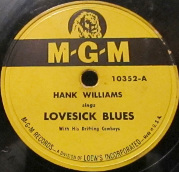
"Lovesick Blues" is a Tin Pan Alley song, composed by Cliff Friend, with lyrics by Irving Mills. It first appeared in the 1922 musical "Oh, Ernest", and was recorded that year by Elsie Clark and Jack Shea. Emmett Miller recorded it in 1925 and 1928, followed by country music singer Rex Griffin in 1939. The recordings by Griffin and Miller inspired Hank Williams to perform the song during his first appearances on the Louisiana Hayride radio show in 1948. Receiving an enthusiastic reception from the audience, Williams decided to record his own version despite initial push back from his producer Fred Rose and his band.
"Wondering" is a popular song written by Jack Schafer and recorded by Patti Page.

"Walkin' After Midnight" is a song written by Alan Block and Don Hecht and recorded by American country music artist Patsy Cline. The song was originally given to pop singer Kay Starr; however, her label rejected it. The song was left unused until Hecht rediscovered it when writing for Four Star Records. Originally Cline was not fond of "Walkin' After Midnight", but after making a compromise with her label she recorded it. However, the first released recording was by Lynn Howard with The Accents, released in August 1956.
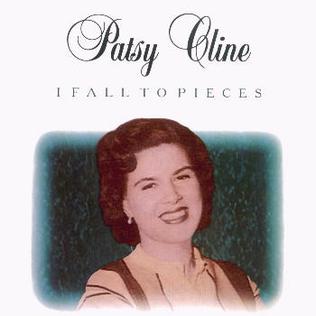
"I Fall to Pieces" is a song written by Hank Cochran and Harlan Howard that was originally recorded by Patsy Cline. Released as a single in 1961 via Decca Records, it topped the country charts, crossed over onto the pop charts and became among Cline's biggest hits. Cline was initially reluctant to record "I Fall to Pieces" and believed its production lacked enough country instrumentation for her liking. Eventually, Cline recorded the song upon the encouragement of her producer.
"Sweet Dreams" or "Sweet Dreams (of You)" is a country ballad, which was written by Don Gibson. Gibson originally recorded the song in 1955; his version hit the top ten of Billboard's country chart, but was eclipsed by the success of a competing recording by Faron Young. In 1960, after Gibson had established himself as a country music superstar, he released a new take as a single. This version also charted in the top ten on the country chart and also crossed over to the Billboard Hot 100, where it peaked at No.93. The song has become a country standard, with other notable versions by Patsy Cline and Emmylou Harris.
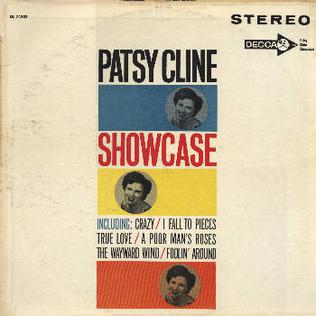
Showcase is a studio album by American country music singer Patsy Cline, recorded with The Jordanaires and released November 27, 1961. It was Cline's second studio album and her first since Patsy Cline in 1957.

Patsy Cline's Greatest Hits is a compilation consisting of American country pop music singer, Patsy Cline's greatest hits. The album consists of Cline's biggest hits between 1957 and 1963. It is one of the biggest-selling albums in the United States by any female country music artist.

Patsy Cline is a studio album by American country music singer, Patsy Cline, released on August 5, 1957. This was the debut album by Cline and would be one of three studio albums Cline would record during her lifetime.
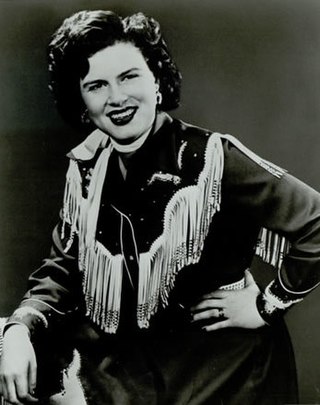
The discography of American music artist Patsy Cline consists of three studio albums, 24 singles, six extended plays, one compilation album, six other charted songs and one album appearance. Cline's discography contains material released during her lifetime. Her first recordings took place under the direction of Four Star Records. Cline's first single, "A Church, a Courtroom, Then Goodbye," was released in July 1955. Four Star issued 17 singles during Cline's four years recording with them. However, only "Walkin' After Midnight" (1957) became a major hit, reaching number 2 on the Billboard country songs chart and number 12 on the Billboard pop music chart.
"Hoop-Dee-Doo" is a popular song published in 1950 with music by Milton De Lugg and lyrics by Frank Loesser.
"That's My Desire" is a 1931 popular song with music by Helmy Kresa and lyrics by Carroll Loveday.
"San Antonio Rose" is a swing instrumental introduced in late 1938 by Bob Wills and His Texas Playboys. Quickly becoming the band's most popular number, Wills and band members devised lyrics, which were recorded on April 16, 1940, and released on Okeh 5694 in August as "New San Antonio Rose". Despite having completed a lengthy Hillbilly/Folk chart run in 1939, which culminated at #1, it quickly rose to the top again, in early 1941. It went on to become the band's theme song for the next forty years, reverting to its original title.

The singles discography of American singer Patti Page contains 127 singles as a lead artist, seven as a collaboration with other artists, seven for the Christmas music market and 19 other charted songs. Page's singles were released for nearly 20 years on Mercury Records. Her debut release was 1947's "Every So Often". In 1948, Page had her first charting release with "Confess", peaking at number 12 on the American Billboard Hot 100. Four more singles reached the top 20 or 30 on the chart in the forties decade: "Say Something Sweet to Your Sweetheart", "So in Love", "I'll Keep the Lovelight Burning" and "Money, Marbles and Chalk". The latter also reached number 15 on the Billboard Hot Country Songs chart. In 1950, "I Don't Care If the Sun Don't Shine" became Page's first top ten Hot 100 single. It was followed by her first to top the charts called "All My Love (Bolero)". Also in 1950 came the release of "Tennessee Waltz". It topped the Hot 100 for several weeks, while also reaching number two on the Country Songs chart and her first to reach number one in Australia.

Unforgettable – A Musical Tribute to Nat King Cole is a soundtrack album released in the UK in 1983 by the CBS Records division of Columbia in conjunction with the broadcast of American pop singer Johnny Mathis's BBC television concert special of the same name that featured Cole's daughter Natalie. The front of the original album jacket credits the concert performers as "Johnny Mathis and Natalie Cole", whereas the CD booklet reads, "Johnny Mathis with special guest Natalie Cole".
"Stop the World (and Let Me Off)" is a song written and originally performed by Carl Belew. It was released as a single first by Belew in January 1958. It was later followed by competing versions by Patsy Cline and Johnnie & Jack. The latter duo's version became the first successful version of the song to be a hit. It was later covered a decade later by Waylon Jennings and then again by Susan Raye in 1974.
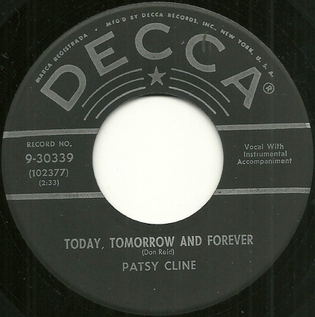
"Today, Tomorrow and Forever" is a song by American country music singer Patsy Cline. It was released as a single in 1957 via Decca Records and was composed by Don Reid. It was the follow-up release to Cline's major hit of 1957, "Walkin' After Midnight." However, "Today, Tomorrow and Forever" was not successful.
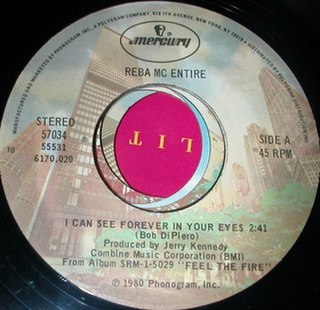
"I Can See Forever in Your Eyes" is a song written by Bob DiPiero, and recorded by American country music artist Reba McEntire. It was released in October 1980 as the second single from the album Feel the Fire. The song became a top 20 hit on the American country music chart.












